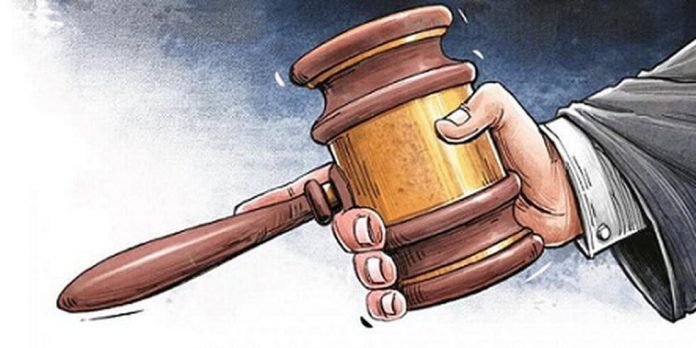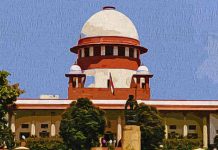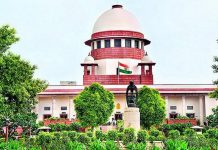This article is written by Ms. Somya Jain, from the Vivekananda Institute of Professional Studies. The article analyses various judicial pronouncements given by the Supreme Court on contempt of court from the year 2010 to 2020.
Table of Contents
Introduction
The legal profession is considered to be a noble profession and therefore, it is the duty of society to uphold the integrity and the dignity of the courts. A certain degree of decorum should be maintained towards the judges and the courts. Any act to lower the dignity of the court in the eyes of the people should be condemned. Thereby, to insulate the institution from unfair criticism and prevent a fall in the judiciary’s reputation in the public eye, the concept of contempt of court has been instituted. Contempt of court could be largely defined as willful disobedience to court orders as well as interference with the administration of justice and overt threats to judges.
Concept of contempt of court
Contempt of court has not been expressly defined in any Act as such, but glimpses of the same can be observed under several provisions. Before the commencement of the Constitution of India, contempt of court was not much recognised even though some laws did find their existence in its provisions. But after the Constitution came into force, contempt was made as one of the restrictions on the Right to Speech and Expression under Article 19(1)(a). Therefore, the following Articles have contemplated the concept of contempt of court:
- As per Article 129 of the Constitution, the Supreme Court is empowered, under the capacity of being considered as a court of record, to punish for any contempt of itself.
- By virtue of Article 215 of the Constitution, the High Courts, being declared as a court of record, shall have the power to punish for contempt of itself.
- Further, Article 142(2) of the Constitution, the Supreme Court has been enriched with the power to pass any order punishing the contempt of itself.
Now, according to the Contempt of Courts Act, 1971, the term contempt has not been expressly defined rather it has explained the different types of contempt. Under the said Act, both the High Courts as well as the Supreme Court are empowered by the Constitution to punish the person for contempt of court in accordance with the provisions.
Civil contempt
According to Section 2(b) of the Contempt of Courts Act, civil contempt means willful disobedience by a person to any of the court’s orders, judgment, decree, direction, writ or willful breach of an undertaking given by a person to the court. This clearly specifies that if any order passed by the court has not been observed by the concerned person then he will be liable for contempt of court. Further, if a person performs an act in contravention to the undertaking given to the court, then also he will be liable under the contempt of court.
Criminal contempt
As per Section 2(c) of the Act, criminal contempt means the publication of any act that scandalises the integrity and lowers the authority of the court, prejudices or interferes with the due course of any judicial proceedings or that interferes or obstructs the administration of justice. Publication of such an act can be either in words, spoken or written, in sign language or by visible representations.
The dilemma lies as to what is the degree of upholding a person guilty of contempt of court. With regards to scandalisation, the courts are unclear on what is regarded as scandalising for the purpose of punishing the person for contempt of court. Many a time, the courts have come across such cases where contempt of court proceedings have been initiated merely on the basis of criticising a judge of a high court or the Supreme Court.
Important judgments of the Supreme Court
In Re: Prashant Bhushan and another
In Re: Prashant Bhushan and another (2020), was one such landmark case that brought the limelight to the scope of contempt of court. As far as the facts of the case are concerned, Prashant Bhushan, who was known for his exemplary contribution to the legal fraternity tweeted two comments on the administration of justice by the courts and on CJI SA Bobde. Firstly, on 27 June 2020, he posted a tweet that attributed responsibility to the Supreme Court in ‘destructing’ India’s democracy for the past six years. The second tweet was posted on 29 June 2020 that negatively pictured the then Chief Justice of India SA Bobde while riding a motorcycle. Although with regards to the second tweet a petition was filed in the Court, the Supreme Court took suo moto cognizance of the petition and initiated contempt proceedings against Prashant Bhushan on 21 July 2020.
The Court held the prima facie view that the said tweets brought the administration of justice in disrepute and were capable of undermining the dignity and authority of the Supreme Court in general and of CJI’s office in particular, in the eyes of the public at large. Thereby, the Court allowed the suo moto contempt proceedings against him.
Prashant Bhushan put forward several contentions before the Hon’ble Court. Some of them being:
- Firstly, he argued that the first petition considered by the Supreme Court in the present case was not sanctioned by the Attorney General of India K.K. Venugopalan even though it was essential under Section 15 of the Contempt of Courts Act and Rule 3(c) of the Rules to Regulate Proceedings for Contempt of the Supreme Court, 1975.
- Secondly, as far as the tweet of 29 July was concerned, he highlighted that it was his anguishment for the working of the non-physical courts which lead to undermining the fundamental rights of the citizens of the country. He stated that mere accentuating the incongruity of the present situation cannot be called contempt of court. It would otherwise be against the Right to free speech as enshrined under Article 19(1)(a) of the Constitution.
- Regarding the 27 July tweet, it was contended that the statement was a bona fide opinion of the contemnor and cannot amount to contempt of court no matter how unpalatable it was to some people.
The Court was of the view that the inherent power of the Supreme Court to take suo moto contempt proceedings without the sanction of the Attorney General was clearly specified in Section 15 of the Contempt of Courts Act and the subsequent Rule 3. Moving further with regards to the tweets, the Court observed that any publication that attacks an individual judge or the court as a whole, casting unwarranted and defamatory perceptions over the character of the judges would be included within the meaning of scandalizing the court. Such an act instils a sense of distrust among the people and impairs their confidence.
The Court observed that defamatory actions against the judges can be viewed as against the judges acting as judges or as individuals. While the latter is not accountable for contempt proceedings, the former is liable to undergo contempt proceedings as it is scandalising the Court itself. If the vilification is directly scandalising the administration of justice, thereby, dwindling the trust and confidence of the public at large, that forms the foundation of justice, towards the judiciary, then such act should mandatorily be punished through contempt proceedings. At last, the Court held that neither the tweets imposed fair criticism on the working of the judiciary nor any bona fide intention was seen behind these tweets. Therefore, the Court held Prashant Bhushan guilty of criminal contempt and a fine of Rupee 1 to be paid by him, in failure of which he would be punished with 3 months imprisonment and be debarred from practicing law for 3 years.
In Re: Hon’ble Justice Shri C.S. Karnan
The case of In Re: Hon’ble Justice Shri C.S. Karnan (2017) was a contempt proceeding against Justice C.S. Karnan who was surrounded by numerous controversies. The facts of the case were Justice Karnan, who was infamous for his actions committed in a courtroom, accused many high court judges of being corrupt, impartial and dependant. A notice was sent to Prime Minister Narendra Modi to take serious actions against his fellow judges. Further, Justice Karnan accused the then Chief Justice of Madras High Court who went against one of his decisions. Justice Karnan also accused the judges of caste-based discrimination against him. He repetitively filed several suo moto cases against his fellow judges who voted for his transfer even after the Supreme Court restrained him from handling any administrative or judicial work.
The Court observed that Justice C.S. Karnan has consistently committed criminal contempt. Justice Karnan has scandalized several judges and accused them of corruption and impartiality without providing any evidence regarding the same. The obnoxious allegations made by him in front of the media and the public at large tarnished the image of the courts and the beliefs of people in the concept of justice. The conduct of the contemnor was both scandalising the court as well as interfering with the court’s proceedings. The Court was seemingly shocked at the behaviour of Justice Karnan and stated that his actions constituted the grossest and gravest actions of contempt of court. The Court held him guilty for criminal contempt of court and sentenced him to 6 months imprisonment.
However, the case suffered several atrocities as the procedure followed by the Court was not proper. The Supreme Court formed a 7 judges bench for the case that is generally instituted in exceptional cases. Further, the written apology given by Justice Karnan was ignored by the Court. The Court failed to formulate any substantial issue underlying the case. The decision was also taken in a hush as no amicus curiae was appointed in the case which was an important step and should be observed by the Court.
In Re: Vijay Kurle and others
In Re: Vijay Kurle (2020), Vijay Kurle along with Rashid Khan Pathan and Nilesh Ojha sent two letters dated 20.03.2019 and 19.03.2019 to the Chief Justice of India Ranjan Gogoi. The above letters levelled scandalous allegations against Justice RF Nariman and Justice Vineet Saran.
The Court observed that the said letters showcase highly scurrilous and scandalous allegations against the judges and such allegations cannot be made against judges and the courts. Further, the Court stated that not even an iota of remorse was shown or apology forwarded by the contemnors. This behaviour, therefore, should not be entertained and it should not be let off leniently. The Court also observed that to comment or criticize the court’s judgment, people should also first have the knowledge to challenge the integrity and authority of a judge. Therefore, the Court held them guilty of contempt of court and sentenced all the three advocates to undergo simple imprisonment of three months along with a fine of Rs. 2000.
M.V. Jayarajan v. High Court of Kerala
In the case of M.V. Jayarajan v. High Court of Kerala (2015), the appellant, while delivering a speech at a public gathering at Kannur in June 2010, used unparliamentary words and abused the Kerala High Courts judgment banning meetings on public roads. Considering the pejorative language used by the appellant, the Kerala High Court initiated contempt proceedings against him and later upheld him guilty of contempt of court and sentenced him to imprisonment for a period of six months. To this order, the appellant filed an appeal in the Apex Court.
The Court observed that any foul language used against the court or disrupting the administration of justice should be combated and prevented. Any encumbrance faced by the judiciary in tendering any judgment is said to obstruct the dispensing of justice and must be repulsed. The Court stated that no person can use abusive language against the judges and threaten them to step down from their offices. Further, the Court observed that the appellant showed no remorse or guilt and was not apologetic for his remarks against the judges. Therefore, the Court upheld the decision of the Kerala High Court except it reduced the sentence from six months to four months.
Hari Singh Nagra v. Kapil Sibal
In the case of Hari Singh Nagra and others Vs Kapil Sibal and others (2010), the concept of fair and reasonable criticism was established with respect to contempt proceedings. Referring to the facts of the case, advocate Kapil Sibal along with others sent a souvenir to be published by an association of lawyers while expressing his concern about the plight of the junior members of the Bar and the falling standards of the legal fraternity. Initially, the souvenir was neither published in the public domain nor was made available for sale, rather it was distributed only among the members of the Bar. However, when the respondent was contesting the elections for the Supreme Court Bar Association, certain excerpts of his souvenir were published in the Times of India newspaper. It was then claimed by the petitioners that the said souvenir was deliberated to bring disrepute to the administration of justice and the functioning of the courts.
The Court has stepped beyond the narrow confines of the contempt proceedings and established the concept of “fair” criticism. The Court observed that any ridicule brought towards the judges and the courts, that hampers the confidence and belief of the public thereby deteriorating the foundation of justice must be prevented at all times. But any criticism which is reasonable, rational and sober, not coloured by any tactics must be welcomed. In accordance with Article 19(1)(a) of the Constitution, freedom of speech and expression when used by the Press and the people to fairly criticize any judgment of the court, then no criminal contempt is said to be committed in such cases. Rather it is treated as a necessary right of the people. Therefore, fair and reasonable criticism on the working of the judges and the courts can be made without condemning it as contempt of court.
Abhyudaya Mishra v. Kunal Kamra
The case of Abhyudaya Mishra v. Kunal Kamra was initiated in the year 2020 and is still under trial. But, the case has brought the concept of contempt of court into the limelight. The famous stand-up comedian Kunal Kamra has been alleged to have scandalised the court by degrading its authority through the publication of tweets on social media. The said tweets criticised the Supreme Court for the way it fast-tracked the bail plea of Arnab Goswami, the Chief of Republic TV, in abetment to a suicide case. Attorney General KK Venugopalan gave his assent to initiate the contempt proceedings against Kamra stating that his tweets were of bad taste and that it was time for people to understand attacking the Supreme Court brazenly would attract punishment. In January 2021, the respondent claimed that the jokes are not reality and do not claim to be so and the fact that mere claims can shake the foundation of the Supreme Court will be an overestimation. To this reply of the respondent some rejoinders were requested to which the court gave assent.
Aditya Kashyap v. Rachita Taneja
In yet another ongoing case of Aditya Kashyap v. Rachita Taneja (2020), Rachita Taneja who is a cartoonist was accused of tweeting objectionable content against the court by way of cartoons. The said post went viral and was widely shared and subscribed to. The Attorney General added that such posts are made to degrade the authority of the Supreme Court in the eyes of the public and therefore, even the cartoons were in contempt of the top court. It was contended by the contemnor that fair criticism cannot be upheld to be contempt and that the foundation of the Court is much stronger as one imagines.
Conclusion
The concept of contempt of court has been time and again pulled up by the judiciary to safeguard the authority and respect of the courts. It is pertinent to understand the value that the judiciary holds in the public domain and discrediting the same will only lead to harm’s way. However, a certain line has to be created to separate contempt from that of the Fundamental Right of free speech and expression. While inquiring about a matter, certain degrees have to be fulfilled in order to enable a court to punish for contempt. The publication made by the contemnor should be scandalising the courts and the administration of justice at large. In no way it means that the freedom of speech is to be curtailed. Therefore, a careful and cautious exercise of contempt power has to be ensured by the judiciary.
References
- Contempt case against Kunal Kamra: Petitioner files rejoined to comedian’s affidavit (scroll.in)
- Rachita Taneja contempt case: Criticism of courts growing, everyone doing it, says SC (scroll.in)
LawSikho has created a telegram group for exchanging legal knowledge, referrals, and various opportunities. You can click on this link and join:
 Serato DJ Crack 2025Serato DJ PRO Crack
Serato DJ Crack 2025Serato DJ PRO Crack











 Allow notifications
Allow notifications


